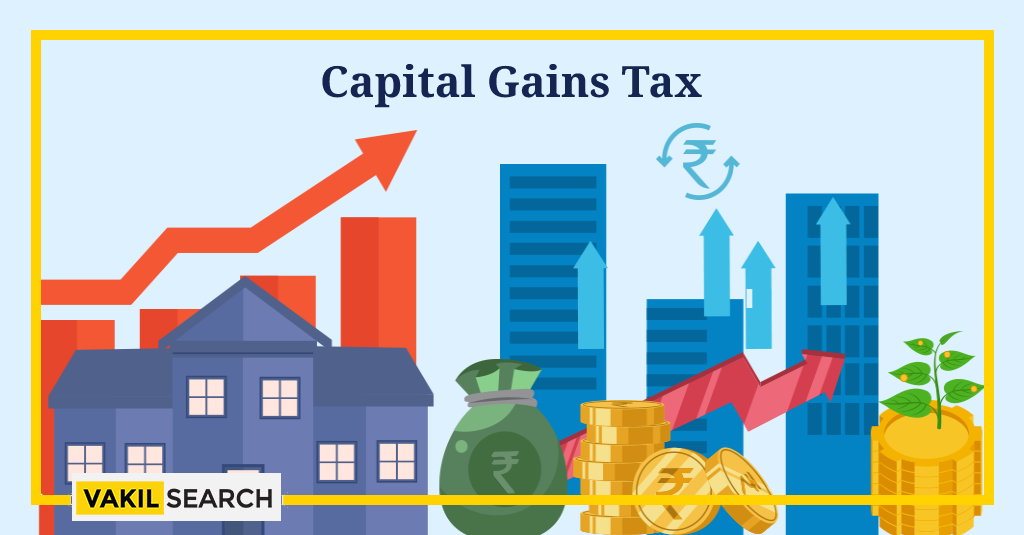When you sell a capital asset for more than you paid for it, you make a capital gain. Any investment product, including mutual funds, stocks, or a piece of real estate (land, a house, etc.), is considered a capital asset. Any rise in value when you sell one of them is referred to as a capital gain. Similar to this, a capital loss is experienced when the value of an asset relative to its acquisition price decreases. A realised capital gain only happens when you sell the asset for more money than you paid for it when you bought it.
Capital Gains Latest Update:
Overview
Capital Gains Tax – Any asset you own constitutes what is called ‘capital.’ So when you sell off an asset, the difference between the buying price and selling price is what is called a capital gain or loss. (ambien online us to us) When the selling price exceeds the buying price, it is a capital gain. And if the selling price falls short of the buying price, it is a capital loss. When you make a gain, it is considered an income which is then subject to income tax. And when you make a loss, you can use the shortfall as a deduction against any other income you may have made during the year, hence reducing your overall tax liability. The nature of the sale of an asset in itself is considered an extraordinary circumstance. So the report of the sale of the asset is required to be mentioned separately as a transaction when you are filing your income tax return.
What is Capital Gains Tax In India?
Income from capital gains refers to any profit or gain that results from the sale of a capital asset. Such capital gains are subject to taxation in the year in which the capital asset is transferred. Capital gains tax is the name for this. Long-term capital gains (LTCG) and short-term capital gains (STCG) are the two categories of capital gains.
One of the most popular investments is buying real estate, mainly because you get to own a home. Others might make an investment with the goal of later reselling the property for profit. It’s significant to remember that for income tax reasons, real estate is considered a capital asset.
How to Calculate Capital Gains(CG)
- Determine the Purchase Price: Find out how much you paid when you bought the asset or investment.
- Determine the Selling Price: Determine the amount you received when you sold the asset or investment.
- Calculate the Difference: Subtract the purchase price from the selling price to find the gain or loss.
- Consider Additional Costs: If you made any improvements or incurred expenses related to the asset, add those costs to the purchase price.
- Apply Deductions or Exemptions: Check if there are any deductions or exemptions available to reduce the taxable gain.
- Determine the Taxable Gain: Subtract any deductions or exemptions from the calculated gain to find the taxable capital gain.
- Apply the Applicable Tax Rate: Multiply the taxable gain by the capital gains tax rate to determine the tax liability.
Defining Capital Assets
A few examples of capital assets are real estate, buildings, houses, cars, jewellery, patents, trademarks, and leasehold rights. This includes having stakes in or ties to Indian businesses. It also includes any other legal rights, such as those related to management or control.
The following doesn’t fit the definition of a capital asset:
- Any inventory, supplies, or raw materials kept for use in a business or profession.
- Items held for personal use, such as clothing and furniture.
- India’s rural(*) agricultural land
- Central government-issued 612% gold bonds from 1977, 7% gold bonds from 1980, or National Defence gold bonds from 1980.
- Bonds with special bearers from 1991
- A bond issued as part of the gold deposit plan.
Types of Capital Assets
| Type of Capital Asset | Description |
| Stocks | Ownership shares in a company that represent a portion of ownership. |
| Bonds | Debt securities where the investor lends money to an entity. |
| Mutual Funds | Pooled investments that invest in a diversified portfolio of assets. |
| Real Estate | Properties such as land, houses, apartments, or commercial buildings. |
| Precious Metals | Valuable metals like gold, silver, platinum, or palladium. |
| Collectables | Items with rarity or uniqueness, like artwork, coins, or stamps. |
| Business Ownership | Ownership interests in a company or partnership. |
| Cryptocurrencies | Digital currencies like Bitcoin, Ethereum, or Litecoin. |
| Intellectual Property | Intangible assets like patents, copyrights, or trademarks. |
| Commodities | Goods or products like oil, gas, wheat, or coffee. |
| Vehicles | Automobiles, motorcycles, or other motor vehicles. |
| Jewellery | Precious gems or valuable pieces of jewellery. |
Note That:
|
Tax on Capital Gains
-
Short-term Capital Gains Tax
A short-term asset is one that has been held for less than 36 months. The time frame for immovable property is 24 months. Profits from the sale of such an item would be considered short-term capital gains and subject to the appropriate tax rates.
-
Long-Term Capital Gains
Long-term assets are any assets held for a period of time greater than 36 months. Profits from the sale of such an item would be considered long-term capital gains and subject to the corresponding tax.
If kept for more than a year, assets such as preference shares, equities, UTI units, securities, equity-based mutual funds, and zero-coupon bonds are also regarded as long-term capital assets.
Achieve financial goals with ease – our Tax Calculator is your reliable companion.
Short-Term Capital Vs. Long Term Capital
For the purpose of taxation, capital has been classified into two types: short-term capital and long-term capital. As the name suggests, the determination of the category is done by assessing the period for which the asset has been held. Usually, assets held for a period of less than a year are considered short-term capital. And assets held for a period longer than a year are considered long-term capital. This rule doesn’t apply to all assets as a blanket rule. Like all rules, there are exceptions to this one as well. Stocks and shares fall under this one-year rule. But land can be held for a period of two years and still fall under the category of short-term capital gains. Gold can be held for a period of three years before it is taxed in the category of long-term capital gains. So calculating the tax liability capital gains or losses is not as simple as just calculating the difference between the buying price and the selling price.
Capital Gains Formula for Calculation
Capital gains are calculated by subtracting the cost of acquisition from the sale price of an asset. The cost of acquisition includes the purchase price, brokerage fees, and other expenses related to the purchase of the asset. The sale price includes the selling price, brokerage fees, and other expenses related to the sale of the asset.
So here are the formulas for calculation:
-
Short-term Capital Gains Tax
Short-term Capital Gain = Full Value Consideration – (Cost of Acquisition + Cost of Improvement + Cost of Transfer).
-
Long-term Capital Gains Tax
Long-term Capital Gain = Full Value of Consideration Received or Accruing – (Indexed Cost of Acquisition + Indexed Cost of Improvement + Cost of Transfer).
where,
- The Cost of Acquisition multiplied by the cost inflation index of the year of transfer/year of acquisition equals the indexed cost of acquisition.
- The Indexed Cost of Improvement is calculated by multiplying the improvement cost by the cost inflation ratio of the transfer and improvement years.
Short-term Capital Gains Tax
- Tax on profits from selling assets held for a short period.
- Taxed at your applicable income tax slab rates.
Long-term Capital Gains Tax
- Tax on profits from selling assets held for a longer period.
- Taxed at a flat rate of 20% with indexation benefit.
Cost Inflation Index (CII):
- Index used to adjust the purchase price of assets for inflation.
- Helps reduce taxable gains on long-term assets.
How to Calculate Capital Gains Tax using CII?
- Use CII to adjust the purchase price of assets.
- Subtract the indexed purchase price from the selling price to calculate taxable gains.
Example of Taxation on Long-term Capital Gains (Real Estate)
When selling real estate held for more than three years, apply 20% tax on indexed gains after deducting expenses.
Exemption on Capital Gains Tax in India
Navigating the complexities of capital gains tax in India can become less daunting when individuals take advantage of the tax benefits offered by the Income Tax Act. These benefits come into play when proceeds from the sale of one asset are wisely reinvested in another.
Let’s explore the key exemptions that can lighten the load of capital gains tax burdens for individuals.
- Section 54: Residential Property Reinvestment
Under this section, individuals can find relief from capital gains tax resulting from the sale of an existing residential property. The crux is to reinvest the sale proceeds in acquiring another residential property.
Recent budget changes have introduced the option to claim an exemption on long-term capital gains from selling residential properties. This can be done by reinvesting the sale proceeds in up to two residential properties, provided the total capital gains do not exceed Rs. 2 Crore.
However, if the new property costs less than the property sold, tax implications may arise as per the Income Tax Act. It’s important to note that this exemption can be claimed only once by a tax-paying individual.
- Section 54F: Diverse Asset Reinvestment
Section 54F offers a tax break on capital gains generated from selling any asset, excluding residential properties. This exemption comes into play when individuals invest their sale consideration, along with the capital gains, into a new property.
For eligibility, the new property must be acquired either 12 months before the sale or within 24 months post-sale.
- Section 54EC: Bonds Reinvestment
This section allows individuals to sidestep capital gains tax by investing the proceeds of a residential property sale in designated bonds within six months.
It’s important to note that the invested funds in these bonds cannot be redeemed before a 60-month period has passed.
- Section B: Agricultural Land Transfer
For those dealing with the transfer of agricultural land, Section B offers respite from capital gains tax. Both short-term and long-term gains from the transfer of agricultural lands can be exempted under this provision.
To qualify, the property transfer must occur at least 24 months before the sale of the asset. The exempted amount needs to be reinvested within 36 months in purchasing a new asset.
Moreover, the acquired property cannot be sold within 36 months of acquisition to maintain the exemption.
Meeting the Criteria for Benefits
Remember that specific conditions must be met to avail these capital gains tax benefits. It’s crucial to identify the applicable benefit and ensure compliance with the prerequisites before applying. To know more, get in touch with our experts right away!
How Do I Avoid Capital Gains Tax?
-
For Long-term Capital Gain Tax:
- Invest in tax-saving instruments.
- Utilise capital gains exemptions by investing in specified assets.
- Benefit from indexation to reduce taxable gains.
- Utilise exemptions for agricultural land.
- Plan for capital gains exemptions under Section 54 or 54F.
-
For Short-term Capital Gain Tax:
- Offset capital gains with capital losses.
- Utilise tax deductions for expenses related to asset sales.
- Take advantage of exemptions for certain investments.
- Consider tax-efficient investment strategies.
Indexation
Another thing to be considered when it comes to capital gains or losses, especially long-term capital gains or losses, is the concept of indexation. Given that time is an important factor in determining the nature of the capital gain or loss, we also have to account for the change in the economic atmosphere as far as long-term capital gains are considered. The buying price has to be adjusted for the cost of inflation before deducting it from the sale consideration to arrive at the capital gain or loss.
For this, you refer to something called a cost Inflation Index or CII, which is a value issued by the income tax department every year by evaluating the change in the cost of living in general. First, you take the CII of the year in which the asset has been sold and divide it by the CII of the year in which the asset was purchased. Next, you multiply this value by the purchase price of the asset. This enhanced cost is what you call the indexed cost’ which is what is considered for the purpose of arriving at the capital gain or loss.
Income Tax Return
Depending on your income and your status, a different income tax return is applicable. For individuals, any income from sources other than business or profession has to be reported in a form called ITR-2. The important information that this form asks for is the date of purchase of the asset, the purchase amount of the asset, the date of sale of the asset, the sale consideration of the asset and any expenses you may have incurred on the sale of the asset such as registration charges or stamp duty.
Capital Gains Tax Strategies to Reduce the Tax Burden
There are various strategies that investors can use to reduce their capital gains tax burden. Some of these include:
- Holding on to the asset for a longer period to qualify for LTCG tax rates.
- Using indexation benefit to reduce the tax liability on LTCG.
- Investing in tax-saving instruments such as ELSS funds to reduce the taxable income.
- Opting for the dividend reinvestment option instead of the dividend payout option to avoid dividend distribution tax.
- Planning the sale of assets in a manner that spreads the gains over multiple financial years to avoid crossing the Rs. 1 lakh threshold for LTCG tax on equity mutual funds.
What Incomes are Charged to Tax Under The Head Capital Gains?
- Stocks: Profits from selling shares or stocks.
- Real Estate: Gains from selling properties.
- Mutual Funds: Capital gains from selling mutual fund units.
- Bonds and Debentures: Profits from selling bonds or debentures.
- Precious Metals: Gains from selling gold, silver, etc.
- Other Capital Assets: Profits from selling artwork, collectables, patents, etc.
Tax on Equity and Debt Mutual Funds
Effective 1 April 2023
|
Type of Funds |
Short-Term Gains |
Long-Term Gains |
| Debt Funds | At tax slab rates of the individual | At tax slab rates of the individual |
| Equity Funds | 15% | 10% over and above Rs 1 lakh without indexation |
Tax Rules for Debt Mutual Funds
Gains from debt mutual funds will henceforth be taxed at slab rates, regardless of holding tenure, according to a recent change to the Finance Bill 2023. As a result, you will lose the indexation benefit. Prior to April 1, 2023, debt mutual funds were required to be held for at least 36 months in order to qualify as a long-term capital asset. It means that you must hold these assets for at least three years in order to profit from long-term capital gains tax. If redeemed within three years, the capital gains are added to your income and taxed at your marginal tax rate.
FAQs
What is the simple formula for Capital Gains?
The simple formula for capital gains is: Selling Price - Purchase Price.
What is the formula for capital gains in Excel?
The formula for capital gains in Excel is =Selling Price - Purchase Price.
What is 30% of Capital Gains?
30% of capital gains can be calculated by multiplying the capital gains amount by 0.3.
How do you calculate Capital Gains on sale of shares?
To calculate capital gains on the sale of shares, subtract the purchase price from the selling price.
What percentage is Capital Gains on shares?
The percentage of capital gains on shares can vary depending on the holding period and applicable tax laws.
How much tax do you pay on selling shares?
The tax you pay on selling shares depends on factors such as the type of shares, holding period, and applicable tax rates.
Do I pay tax when I sell shares?
Yes, tax is payable when you sell shares, subject to certain exemptions and thresholds.
Is capital gain 10% or 20%?
In India, LTCG tax on stocks, mutual funds, and equity investments is 10% if gains reach ₹1 lakh in a fiscal year. With an indexation benefit for other assets including real estate, gold, and debt mutual funds, the LTCG tax rate is 20%.
How do I calculate capital gains tax on mutual funds?
To calculate capital gains tax on mutual funds, subtract the purchase cost from the selling proceeds and apply the applicable tax rate.
How to calculate capital gains tax on property?
Calculate capital gains tax on property by subtracting the indexed cost of acquisition from the selling price and applying the applicable tax rate.
Do long term capital gains count as income?
Yes, long-term capital gains are considered as taxable income.
How much of my capital gains are taxable?
The taxable portion of capital gains depends on factors such as the type of asset, holding period, and applicable tax laws.
Is capital gains tax going up in 2023?
No! There had no major changes announced by our finance minister in the budget 2023 for capital gains tax.
At what age you do not pay capital gains tax?
There is no specific age limit where capital gains tax is completely waived. But people between the age group 60 to 80, will be exempted from LTCG.
What is the capital gains tax on property on sale?
The capital gains tax on the sale of property can vary depending on factors such as the type of property, holding period, and applicable tax laws.
Do capital gains tax affect your tax bracket?
Yes! It is included in the Adjusted Gross Income and it affects the tax bracket.
Is long term Capital Gain Taxable?
Yes, it is taxable.
What is capital gain tax on shares?
The capital gains tax on shares can vary based on factors such as the type of shares, holding period, and applicable tax laws.
What is the penalty for late payment of capital gains tax in India?
Late payment of capital gains tax in India may attract interest charges and penalties as per the tax regulations.
Do I have to pay capital gains tax immediately?
The payment of capital gains tax typically occurs at the time the tax return is filed, but particular deadlines and conditions may change depending on local tax legislation.
How can I minimise capital gain tax?
Strategies to minimise capital gains tax include utilising exemptions, deductions, and tax-efficient investment strategies.
What happens if you can't pay capital gains tax?
If you can't pay capital gains tax, it may result in penalties, interest charges, and potential legal consequences as per the tax regulations.
What is the 12-month rule for capital gains?
It is nothing but the difference in the holding period in long term and short term capital gains.
Can cryptocurrency be considered as a capital asset?
Yes! Crypto or digital tokens are all considered to be capital assets.
Conclusion
The calculation of the capital gain or loss can significantly impact the overall calculation of your taxable income and consequently your tax liability. Given that there are so many stipulations when calculating your tax liability makes it all the more critical to make sure that you have verified all the rules and checked all the right boxes in your tax return. If you have sold or are planning on selling any of your capital assets, get in touch with us so we can find you the best expert assistance in calculating your capital gains or losses as well as filing your tax returns.
| If you have any queries or need an understanding on the same, our experts at Vakilsearch will be happy to assist you! |
Helpful Links










